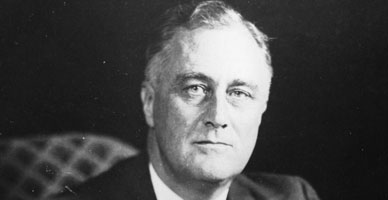1933 Inaugural Address
Franklin Roosevelt Speeches: This 1933 inaugural address was delivered when Franklin D Roosevelt took up his first term as President of the United States on the March 4.
Background of the 1933
Presidential Inaugural Address
After the Democrat’s landslide victory over the Republicans in the year 1932, Franklin Roosevelt took to the stands to address the tens of millions of Americans in the midst of the Great Depression.
It was much anticipated because many were looking for the President for leadership in his urgent response to the crisis at hand.
In his speeches, Roosevelt touched on several issues including unemployment, foreign policy and most of all, assuring the Americans that they have ‘nothing to fear but fear itself.’
Franklin Roosevelt Speeches
1933 Inaugural Address
President Hoover, Mr. Chief Justice, my friends: this is a day of national consecration, and I am certain that on this day my fellow Americans expect that on my induction into the presidency, I will address them with a candour and a decision which the present situation of our people impels.
This is pre-eminently the time to speak the truth, the whole truth, frankly and boldly. Nor need we shrink from honestly facing conditions in our country today. This great nation will endure as it has endured, will revive and will prosper.
So, first of all, let me assert my firm belief that the only thing we have to fear is fear itself – nameless, unreasoning, unjustified terror which paralyses needed efforts to convert retreat into advance.
In every dark hour of our national life, a leadership of frankness and of vigour has met with that understanding and support of the people themselves which is essential to victory. I am convinced that you will again give that support to leadership in these critical days. In such a spirit on my part and on yours we face our common difficulties. They concern, thank God, only material things. Values have shrunken to fantastic levels; taxes have risen; our ability to pay has fallen, government of all kinds is faced by serious curtailment of income, the means of exchange are frozen in the currents of trade, the withered leaves of industrial enterprise lie on every side, farmers find no markets for their produce, the savings of many years in thousands of families are gone.
More important, a host of unemployed citizens face the grim problem of existence, and an equally great number toil with little return. Only a foolish optimist can deny the dark realities of the moment.
Yet our distress comes from no failure of substance. We are stricken by no plague of locusts. Compared with the perils which our forefathers conquered because they believed and were not afraid, we have still much to be thankful for. Nature still offers her bounty and human efforts have multiplied it. Plenty is at our doorstep, but a generous use of it languishes in the very sight of the supply.
Primarily, this is because the rulers of the exchange of mankind’s goods have failed through their own stubbornness and their own incompetence, have admitted their failures and have abdicated. Practices of the unscrupulous money changers stand indicted in the court of public opinion, rejected by the hearts and minds of men.
True, they have tried. But their efforts have been cast in the pattern of an outworn tradition. Faced by failure of credit, they have proposed only the lending of more money. Stripped of the lure of profit by which to induce our people to follow their false leadership, they have resorted to exhortations, pleading tearfully for restored condition. They only know the rules of a generation of self-seekers. They have no vision, and when there is no vision the people perish.
Happiness lies not in the mere possession of money, it lies in the joy of achievement, in the thrill of creative effort. The joy and moral stimulation of work no longer must be forgotten in the mad chase of evanescent profits. These dark days will be worth all they cost us if they teach us that our true destiny is not to be ministered unto but to minister to ourselves, to our fellow men… This nation asks for action, and action now.
Our greatest primary task is to put people to work. This is no unsolvable problem if we face it wisely and courageously. It can be accomplished in part by direct recruiting by the Government itself, treating the task as we would treat the emergency of a war, but at the same time, through this employment, accomplishing greatly needed projects to stimulate and reorganize the use of our great natural resources.
Hand in hand with this, we must frankly recognize the overbalance of population in our industrial centres and, by engaging on a national scale in a redistribution, endeavour to provide a better use of the land for those best fitted for the land. The task can be helped by definite efforts to raise the values of agricultural products and with this the power to purchase the output of our cities. It can be helped by preventing realistically the tragedy of the growing loss, through foreclosure, of our small homes and our farms. It can be helped by insistence that the Federal, the State, and the local governments act forthwith on the demand that their cost be drastically reduced. It can be helped by the unifying of relief activities which today are often scattered, uneconomical and unequal. It can be helped by national planning for and supervision of all forms of transportation and of communications and other utilities that have a definitely public character. There are many ways in which it can be helped, but it can never be helped by merely talking about it. We must act. We must act quickly.
Finally, in our progress towards a resumption of work we require two safeguards against a return of the evils of the old order. There must be a strict supervision of all banking and credits and investments, there must be an end to speculation with other people’s money. And there must be provision for an adequate but sound currency.
These are the lines of attack. I shall presently urge upon a new Congress in special session detailed measures for their fulfilment, and I shall seek the immediate assistance of the several States.
I am prepared under my constitutional duty to recommend the measures that a stricken nation in the midst of a stricken world may require. But, in the event that the Congress shall fail to take one of these two courses, in the event that the national emergency is still critical, I shall not evade the clear course of duty that will then confront me. I shall ask the Congress for the one remaining instrument to meet the crisis… broad Executive power to wage a war against the emergency as great as the power that would be given to me if we were in fact invaded by a foreign foe.
For the trust reposed in me I will return the courage and the devotion that befit the time. I can do no less.
We face the arduous days that lie before us in the warm courage of national unity, with the clear consciousness of seeking old and precious moral values, with the clean satisfaction that comes from the stern performance of duty by old and young alike. We aim at the assurance of a rounded, a permanent national life.
We do not distrust the the future of essential democracy. The people of the United States have not failed. In their need they have registered a mandate that they want direct, vigorous action. They have asked for discipline and direction under leadership. They have made me the present instrument of their wishes. In the spirit of the gift I will take it.
In this dedication of a nation we humbly ask the blessing of God. May He protect each and every one of us! May He guide me in the days to come.

